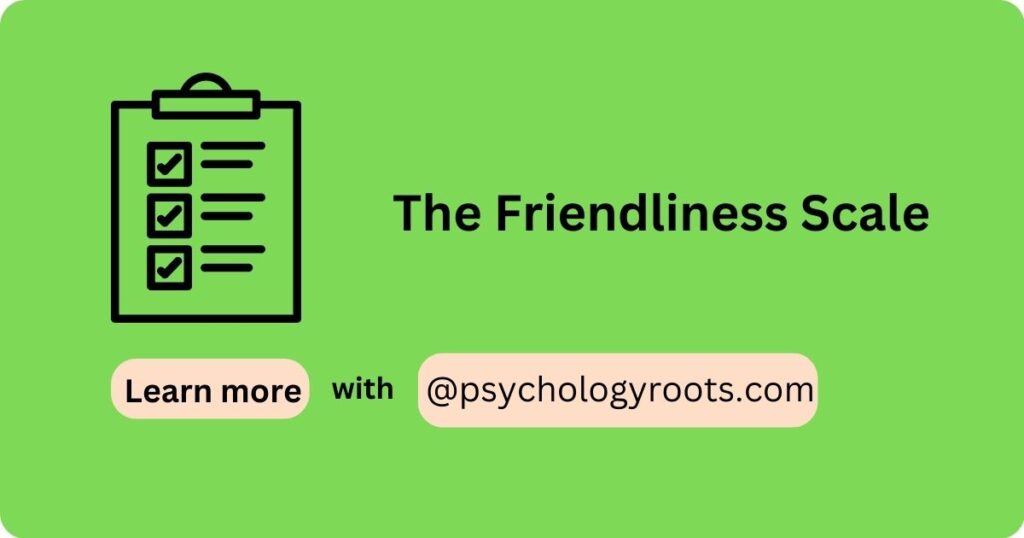Table of Contents
The Friendliness Scale
Here in this post, we are sharing the “The Friendliness Scale”. You can read psychometric and Author information. We have thousands of Scales and questionnaires in our collection (See Scales and Questionnaires). You can demand us any scale and questionnaires related to psychology through our community, and we will provide you with a short time. Keep visiting Psychology Roots.
About Scale Name
Scale Name
The Friendliness Scale
Author Details
J.M. Reisman
Translation Availability
Not Sure

Background/Description
The Friendliness Scale is a psychological assessment tool used to measure a person’s comfort level in social situations. It was developed by psychologist John Reisman, who argued that friendliness included four qualities: Self-Concept, Accessibility, Rewardingness, and Alienation. Reisman found that people who received low scores on his test reported having just as many friends as those who received high scores, but they were less satisfied with their friendships.
He also found that while low scorers knew what to say to people in different situations, their problem was that they did not know how to say the right thing. Reisman did not speculate on how people can change this aspect of their personality, but clinicians who help clients to improve their social skills point to a number of specific changes that can be made, many of which involve nonverbal communications or body language
Administration, Scoring and Interpretation
The Friendliness Scale is typically administered as a self-report questionnaire, either on paper or online. Respondents are asked to rate their agreement with each item on a Likert-type scale, ranging from “strongly disagree” to “strongly agree.” The scale consists of items that assess each of the six components of friendliness as proposed by J.M. Reisman: Sociability, Affability, Comportment, Respectfulness, Altruism, and Liveliness.
Once all items have been completed, the scores for each component are summed to provide an overall score for each component. These component scores can then be combined to provide an overall score for friendliness. Higher scores indicate greater levels of friendliness.
Reliability and Validity
The Friendliness Scale has been found to have good reliability and validity in multiple studies. Reliability refers to the consistency of scores obtained from the scale, while validity refers to whether the scale measures what it is intended to measure.
Available Versions
40-Items
Reference
Reisman, J. M. (1983). SACRAL: Toward the meaning and measurement of friendliness. Journal of Personality Assessment, 47(4), 405-413.
Important Link
Scale File:
Frequently Asked Questions
Q: What is the Friendliness Scale?
A: The Friendliness Scale is a self-report questionnaire designed to measure the construct of friendliness. It includes items that assess six components of friendliness proposed by J.M. Reisman: Sociability, Affability, Comportment, Respectfulness, Altruism, and Liveliness.
Q: How is the Friendliness Scale administered?
A: The scale is typically administered as a self-report questionnaire, either on paper or online. Respondents rate their agreement with each item on a Likert-type scale, with higher scores indicating greater levels of friendliness.
Q: What is the reliability of the Friendliness Scale?
A: The scale has been found to have good internal consistency, with Cronbach’s alpha coefficients typically ranging from .70 to .90 across different samples and translations.
Q: What is the validity of the Friendliness Scale?
A: The scale has been found to have convergent and discriminant validity, indicating that it measures a unique construct of friendliness that is related to other constructs associated with positive social interactions.
Q: Is the Friendliness Scale available in different languages?
A: Yes, the scale has been translated into multiple languages for use in cross-cultural research. However, the availability of translations may vary depending on the specific language needed.
Q: Can the Friendliness Scale be adapted or modified for use with different populations or settings?
A: Yes, researchers have adapted the scale for use with different populations or to measure related constructs, such as interpersonal warmth or likability. However, it is important to consider the psychometric properties of any adaptations or modifications before using them in research or clinical settings.
Disclaimer
Please note that Psychology Roots does not have the right to grant permission for the use of any psychological scales or assessments listed on its website. To use any scale or assessment, you must obtain permission directly from the author or translator of the tool. Psychology Roots provides information about various tools and their administration procedures, but it is your responsibility to obtain proper permissions before using any scale or assessment. If you need further information about an author’s contact details, please submit a query to the Psychology Roots team.
Help Us Improve This Article
Have you discovered an inaccuracy? We put out great effort to give accurate and scientifically trustworthy information to our readers. Please notify us if you discover any typographical or grammatical errors.
Make a comment. We acknowledge and appreciate your efforts.
Share With Us
If you have any scale or any material related to psychology kindly share it with us at psychologyroots@gmail.com. We help others on behalf of you.